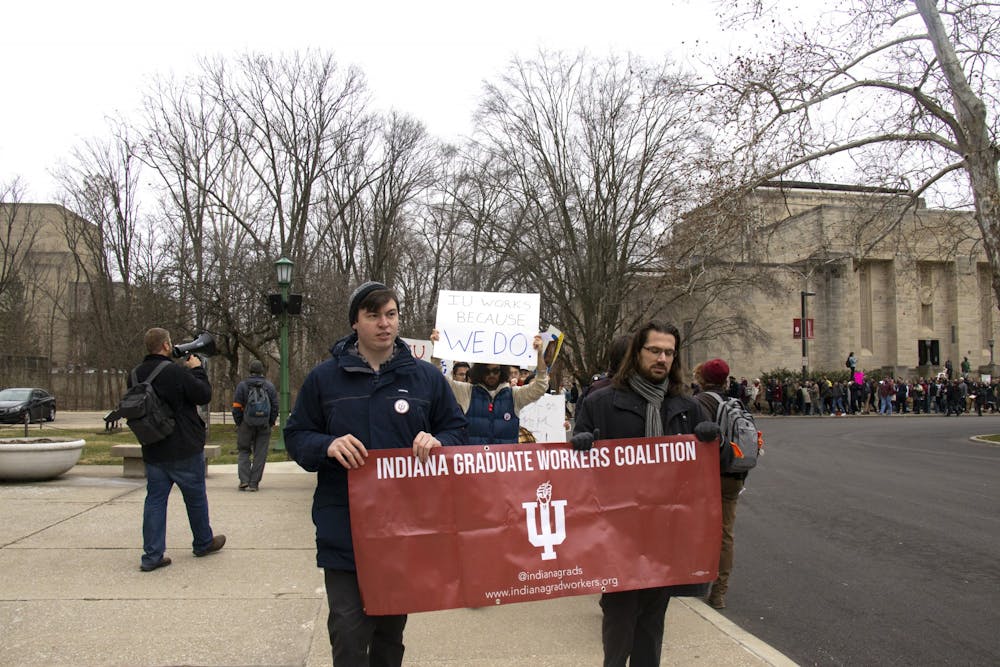About 450 people gathered at the clock by Woodburn Hall Tuesday, carrying signs, blowing whistles and chanting, “Hey hey, ho ho! All these fees have got to go.”
Protesters marched from Woodburn Hall to Herman B Wells Library, where 36 members of the Indiana Graduate Workers Coalition met Vice Provost for Graduate Education and Health Sciences David Daleke to discuss fees graduate students have to pay. For the past 18 months, the Indiana Graduate Workers Coalition has gathered more than 1,900 signatures online to get rid of mandatory fees and the international student fee.
According to the petition, members of the coalition believe the health fee, transportation fee and activity fees are unnecessary. The health fee costs $240.25, the transportation fee costs $133.14 and $213.60.
International graduate students have to pay an additional $700 in international service fees per year.The international services fee supports advising and technical services for international students, according to the Office of International Services website.
“We want to end the mandatory fees because we work for the university and also we do not get paid enough to afford the mandatory fees,” doctoral student Denisa Jashari said.
In a press release, the coalition stated that its meeting with administration was productive, but they were concerned by the lack of commitment Daleke's office showed to come up with a solution.
Emily Ekl, a graduate student in sociology, said graduate students are paying to teach rather than getting paid to teach.
“These fees are essential for what AIs, TAs and instructors for courses to do our job, and the fact that we have to pay thousands of dollars a year just to do our job really isn’t fair in light of the fact we make so little money anyway,” Ekl said.
To begin the march, coalition member Nate Schmidt gave a speech about the financial stress many graduate students face. He said he had to pay for a minor car repair that only cost $200, but he panicked.
“I heard a sound,” he said. “It was the sound of the muffler on my 20-year-old car falling apart on my way to Second Street. I thought, ‘This is it. I can’t afford this, and I have to get my son to the dentist on Thursday. I’m gonna have to drag him into the food pantry again at the end of this month because I haven’t been paid since Dec. 14.’”
When protesters reached the library, the 36 coalition members walked inside for the meeting while protesters stood outside and chanted, “What do we want? End the fees! When do we want it? Now!”
Outside, Schmidt read a statement that would be read during the meeting between the coalition members and Daleke.
“These fees are pushing the most precarious workers on this campus into poverty,” he read. “The stress of living in poverty, worrying about where our next meal is going to come from, how we are going to pay for our rent or which medications we can afford to pay for this month has a devastating effect on our ability to function in and outside our classrooms, labs and studios.”
In a packet provided to the Indiana Daily Student, the coalition’s closing statement emphasized some of its main arguments, including how their job is crucial to the operations of the university.
“We hope that Vice Provost’s office will recognize that we are asking for the most basic form of dignity and security possible — that we do not want to pay these absurdly high fees for utilizing resources that we need in order to perform our services for the university, for which we are undercompensated to begin with!” part of the coalition's closing statement reads.




